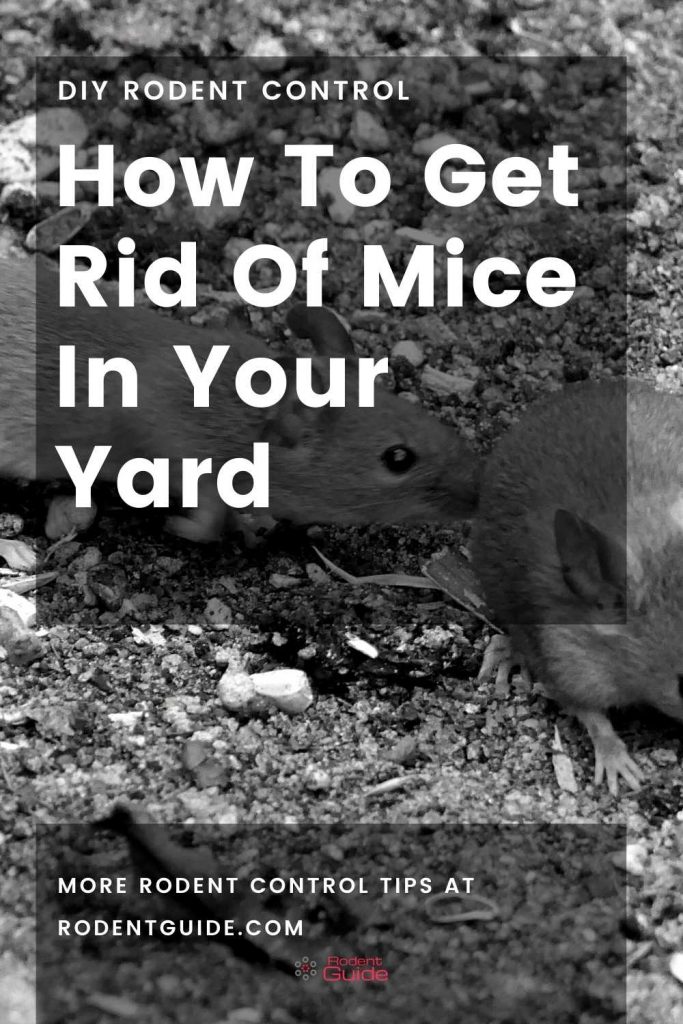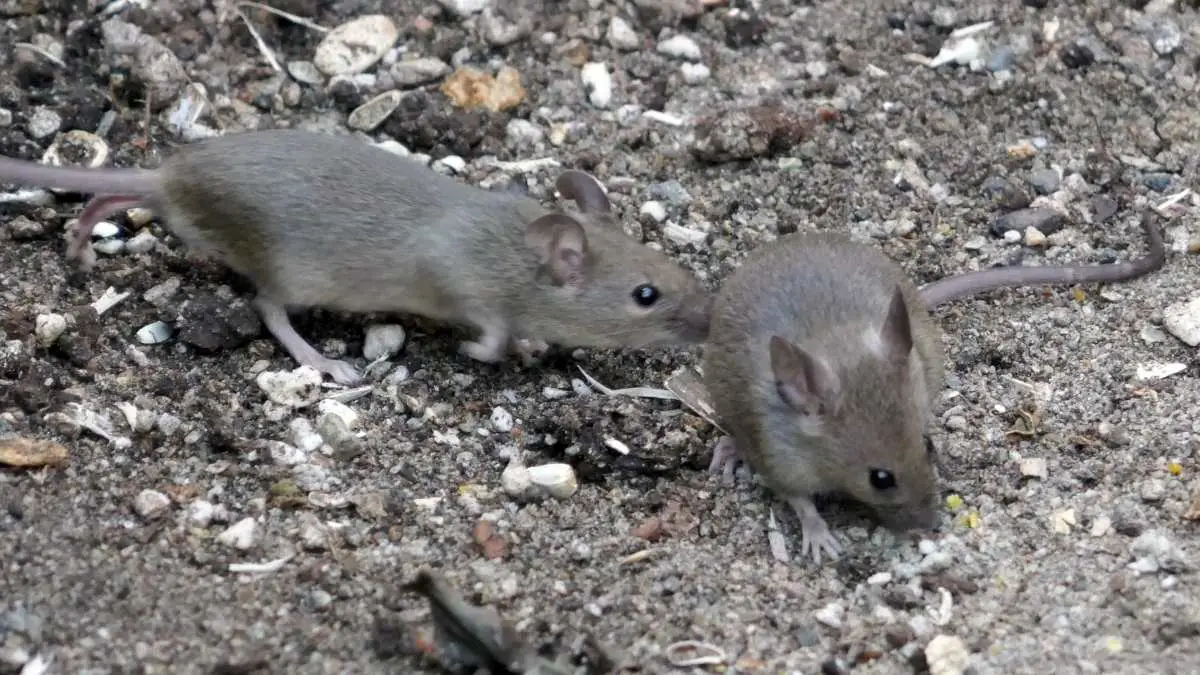Mice are impressively well-adapted to living around human establishments like gardens, lawns, and yards.
They’re so secretive you won’t even notice they’re there until they migrate indoors (using a mouse entry point), looking for warmth in the winter.
To stop mice from getting near your home, you must deter them from your yard.
Want to know how to get rid of mice in your yard? Then read on.

Why do I get mice in my yard?
These critters may be cute, but they love to tunnel and chew. The damage they cause is both bothersome and expensive.
Here’s a list of reasons why they’re in your yard:
- Mice are drawn to food, shelter, and familiar scents. If you have these things in your yard, they will make it their home.
- If one of your immediate neighbors has food or shelter and you have the other things mice need, they will gladly travel between your yards.
- Mice are also drawn to familiar environments. If mice have lived in your yard before, the smell of mouse poop, urine, and nesting materials will attract new visitors.
- When it comes to shelter, mice will live in anything that offers protection from rain, strong winds, and predators. This might include
Low decks have similar structures: The mice can stuff them with materials and use them as nests.
Patio furniture: Furniture with enclosed sections that go all the way to the ground is the perfect hiding place for mice.
BBQs: If you have a barbecue grill but don’t use it often, mice will likely claim it as their own. Mice can live in/under garden sheds to protect them from rain, wind, and predators. They also help the mice keep warm during the winter.
Long grass or shrubbery: Mice don’t like to travel across flat, open spaces. If there’s long grass in your yard, mice will feel protected, and they may make it a permanent residence.
How to Get Rid of Mice in Your Yard Using These 5 Tips

Tip 1: eliminate food sources
Mice are omnivorous, so they will eat almost anything they can find. That said, they typically prefer cereals, grains, and seeds. For this reason, be sure to remove the following from your yard.
Keeping food away will help keep mice away.
Birdseed
You read that right. If you have a bird feeder, ensure it is mouseproof, and place it over a flat surface like a concrete or tile patio that’s easy to sweep.
This should limit spillage and make cleaning up after messy birds easy.
Pet food
Do you like to feed your cat or dog outside? Whether they’re on the grass or deck, small chunks of food will fall. Mice will show up to take advantage of the situation, and you can be sure they’ll remember to come back.
Vegetables and fruit
Shrubs, fruit trees, and gardens will attract mice to your yard. Be sure to collect and dispose of any fruit that has fallen to the ground. You’ll also want to pick ripe fruit even if it’s still attached to the tree.
Compost
Composting may seem like an excellent way to enrich the soil in your yard, but it is an open buffet to mice, rats, and raccoons.
You’ll need a composter raised off the ground, preferably with separate bins, so you can have a compartment for new additions and another for compost ready to spread.
Tip 2: Use traps
Depending on the type used, traps can let you capture mice and then let them go far from your home. Unfortunately, this approach means you’ll have to be in close contact with live mice, which can be dangerous because they spread disease.
If you want to know how to get rid of backyard mice, then killing them (provided it is done humanely) may be better.
Basic (spring-loaded) mousetraps
Spring-loaded mouse traps are the most common type available. They’re made from a wood board with a powerful spring hinge at its center connected to a pressure trigger.
The slightest pressure will set them off and send a metal bar crashing into the skull or neck of the unsuspecting mouse.
Be very careful when using these in your yard! Yes, you want to catch the field mice or control mice in general, but you do not want to catch a neighborhood pet or child!
Make sure you place them where a child cannot reach them.
Electric mousetraps
Electric traps deliver a lethal dose of electricity when rodents complete a circuit by touching two electrodes at the entrance or between the entrance and the bait.
The electrodes are kept in an insulated box to prevent accidental harm to pets and humans. They can be designed for single-catch home use or multiple-catch commercial use.
Live capture mouse traps.
These traps benefit from being more humane than spring-loaded traps and electric traps. However, they may prove disadvantageous if you don’t intend to release the animal. Instead, you must check the traps regularly so the captured mice don’t die from starvation or stress.
Mice captured using this method must be released far away, as they have strong homing abilities.
It’s worth noting that house mice rarely survive far from human settlements in areas populated by other small mammals like field mice.
Tip 3: Pro-tip for your traps
Put the mouse traps in the area where mice are most active. Mice tend to run close to walls, and they’re unlikely to go more than 10 feet to obtain bait (even if it’s peanut butter!).
You’ll want to cleverly place your bait in the areas mice frequent but far away from areas that your children and pets like to visit.
Tip 4: Repellent
Mice hate the smell of garlic, cayenne pepper, and peppermint. These can be used to repel mice. They have a strong sense of smell, so these odors will likely keep them away. These are just some of the natural mouse-repellent options you can use.
Note: While natural repellents do the trick, you will be better off using commercial products (as long as it’s non-toxic).
They’re more effective and longer-lasting.
Another fantastic repellent is a cat! We know that having a cat keeps mice away from your home and yard.
Tip 5: Poison
Mouse poison is convenient and very effective, but it requires caution, especially if you have pets and young children. Different mouse poison works in different ways too.
Common mouse-poison types include:
Metal phosphides
This category acts fast and will kill mice in less than 72 hours. It’s the best poison if mice display immunity to conventional poisons.
Metal phosphide rodenticides are preferred because they don’t leave traces in animal tissue. Therefore, there’s no need to worry if your pet eats the poisoned rodent.
Anticoagulants
Anticoagulants are the more common type of poison on the market. When mice ingest them, they bleed out and die. Unfortunately, mice killed in this manner remain poisonous to pets and other animals.
I cannot emphasize it enough. If you have to use it, then please use mouse poison responsibly. I always place the poison in live catch mouse traps. That way, the mice will not be able to escape the trap, limiting the chances of secondary poisoning. The Tin Cat trap by Victor is an excellent example.
Conclusion
In this post, we have discussed the best way to get rid of mice in backyard areas. You can use some or all of the tips here to achieve that.
Sometimes, getting rid of mice in your yard won’t be as simple as setting traps and putting out poison, especially if you have pets or small children.
I don’t particularly appreciate using poison to control mice or other rodents. Instead, you can achieve DIY pest control with a reduced negative impact on the local environment.
If you must use it, then please use mouse poison responsibly.
Good luck!








